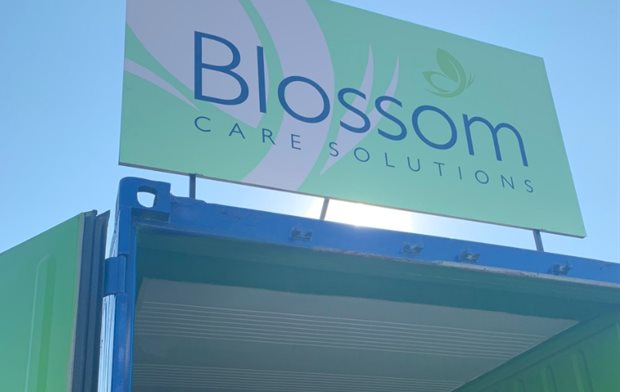
Subscribe & Follow
Grassroots commercial enterprises launched at Yes4Youth hub in Tembisa

The hub has introduced a manufacturing business aimed at producing and selling environmentally-friendly sanitary products and a micro-distribution business aimed at facilitating the supply of FMCG goods to homes, retailers and spaza shops within the area.
Officially opened in June 2018, the Kago Community Hub offers local youth access to a diverse range of training programmes ranging from coding to nutrition and business management, as well as hosting an urban aquaponic farming initiative. When fully functional, the two new projects will create as many as 50 direct jobs at the hub and a further 300 indirect jobs.
“The hub is a space that, through the use of frontier technology, demonstrates what members of the community can be and what they can strive towards, seeding competitive local businesses and empowering youth to work in and grow these small businesses. It is a space where role models and exposure to global best practice can empower and inspire youth to lift themselves from the social and economic situations in which they often find themselves,” Dr Tashmia Ismail-Saville, chief executive of YES.
Blossom Care Solutions
Blossom Care Solutions is partnering with YES to introduce a manufacturing, sales and marketing business that is focused on producing feminine care products. Aiming to provide every girl in SA with access to sanitary dignity, Blossom is using new technology to manufacture 100% compostable and affordable menstrual hygiene products.
The Blossom sanitary pads fully decompose within 90-120 days compared to almost 50 years with ordinary pads. The business is also creating work for 12 previously unemployed female youth from Tembisa.
Based on the concept of a product that is made for women, by women, a key component of the business is that at the end of the first year of production, the 12 young women will take ownership of the business via a social franchise. These women will then become owners of the business with the support of a team at Blossom, who will continue to oversee training, marketing, sourcing of raw materials and expansion programmes.
Blossom is working in close association with YES, and will invest in similar operations at every YES community hub location around the country.
12 Ladies employed by Blossom in partnership with YES will spend 12 months being trained on entrepreneurship. They will end their 12 months as owners of the business.The hub initiative is a drive for sustainability through producing more than 500 000 sanitation pads in year 1. pic.twitter.com/NzmcjTfd00
— Yes4Youth (@Yes4YouthZA) May 28, 2019
Buddibox is a last-mile distribution, sales and marketing business that has contracts with large FMCG companies which allow it to deliver their products from the Buddibox warehouse at the Kago Hub to homes, spaza stores, and other retailers in the Tembisa area.
Using a tech platform similar to Uber, community members can earn an income from hyper-local distribution of products. Anyone who has a bicycle, a scooter, a minivan – any form of transport – can register on the Buddibox app as a distribution agent. Then, if there are deliveries available, the community member can pick it up, deliver it and get paid.
Benefits of this business model:
• An efficient way of managing distribution using local people with local knowledge, resulting in speedier delivery of items.
• The FMCG companies do not need to own the delivery vehicles and merely pay for the short-term delivery cost, making deliveries more cost-efficient.
• Local community members profit from the ownership of their transport in a way that they have not been able to previously, enabling them to “sweat their assets”.
Tackling SA’s youth unemployment issues
“This is a key strategy that YES is beginning to deploy,” explains Ismail-Saville. “Within the next 12 months, a further 6-8 hubs will become operational, each focusing on developing commercial enterprises on site, as well as continuing to offer numerous training programmes from digital to aquaponics’ and small business development support programmes.”
The hubs that YES is rolling out aim to provide smart infrastructure solutions as a way to tackle South Africa’s youth unemployment issues, bringing economic opportunities to the townships where the largest proportion of unemployed youth can be found.
“In Tembisa, for example, when we are fully operational with all of the planned enterprise development projects, we will have created 390 permanent jobs and a further 2,500 indirect jobs in the community,” adds Ismail-Saville.
“The enterprises at the hub will generate R120 million annually in revenue that will contribute to and develop the local township economy. Furthermore, salaries paid to staff will generate an additional R55 million in spending power, most of which will be spent locally.”
These hubs offer the opportunity for business development, for a route to market as well as critical skills training. The income generation potential combined with the imperative of reversing the apartheid scars of dormitory towns means that the community hubs have the possibility to drive serious economic transformation in South Africa.
Related
The YES Top 35 Under 35 Awards - Celebrating 35 trail blazers shaping tomorrow today 10 Sep 2024 Why business needs to partner with training institutions to develop entrepreneurial skills! 26 Aug 2024 SU student heads online learning platform to help bridge digital divide 30 Jul 2024 Empowering our youth to leverage technology to build a better world 7 Jun 2024 Mastercard expands Yes partnership to combat youth unemployment 31 Jan 2024 Microsoft partners with YES to deliver youth AI training 30 Oct 2023








